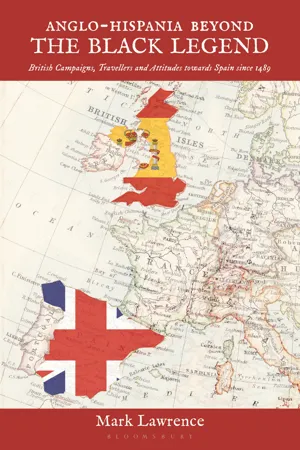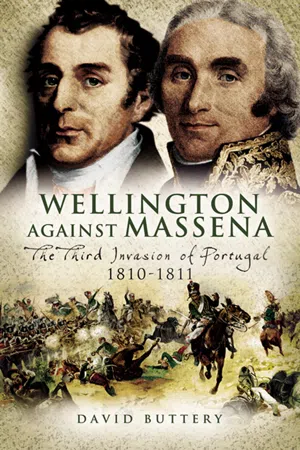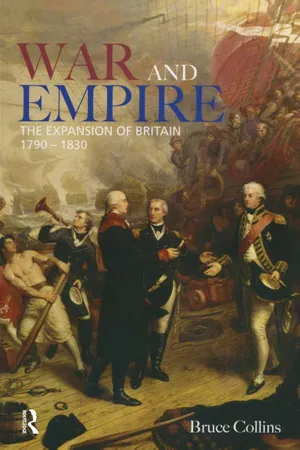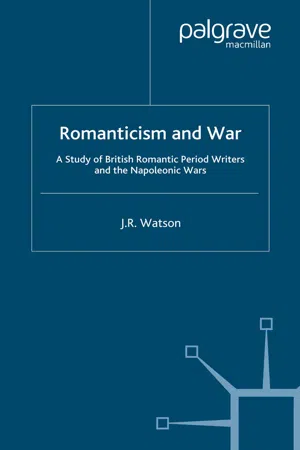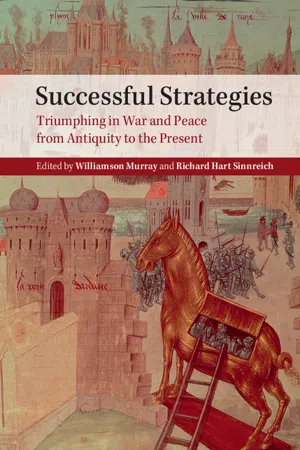History
Peninsular War
The Peninsular War (1807-1814) was a conflict fought in the Iberian Peninsula during the Napoleonic Wars. It pitted the forces of France, led by Napoleon, against the allied forces of Spain, Portugal, and the United Kingdom. The war was marked by guerrilla warfare, sieges, and major battles, and ultimately ended with the defeat of the French and the restoration of the Bourbon monarchy in Spain.
Written by Perlego with AI-assistance
Related key terms
1 of 5
11 Key excerpts on "Peninsular War"
- eBook - ePub
Anglo-Hispania beyond the Black Legend
British Campaigns, Travellers and Attitudes towards Spain since 1489
- Mark Lawrence(Author)
- 2023(Publication Date)
- Bloomsbury Academic(Publisher)
4 The Peninsular War and its aftermathThe Peninsular War (1808–14) opened a ‘short’ nineteenth century for Spain. Bounded by two foreign wars, the first causing devastation at home and, indirectly, in Spanish America, and the second (1898) stripping Spain of its remaining pretensions to world empire, the nineteenth century was marked by war, revolution and counter-revolution. It was spawned by the impact of the French Revolution and the rise of Napoleon, a period of trauma which robbed Spain of its eighteenth-century Bourbon alliance and made its own progressives more progressive and its much larger number of traditionalists reactionary. The Peninsular War (known in Spain from the 1830s as the ‘War of Independence’) snatched away Spain’s world-power status whilst also guaranteeing her conflicted future. These six years etched indelible marks in French and especially British political and cultural identity. In Spain, these years bequeathed the fault lines of 170 years of subsequent history: from the national and international image of guerrilla warfare to the founding myths of incompatible Left versus Right claims to national identity, from the origin of the stereotypical ‘Two Spains’ to the decades of military interventionism in modern politics which would culminate in the civil war of 1936–9.From a British point of view, the Peninsular War might seem merely a footnote (albeit a large one) in over a century of Anglo-French struggle. But this bird’s eye view would miss a more profound entanglement arising from a generation of young men who served in the only protracted British land campaign during the French Wars of 1792–1815. Over the past four decades, a wealth of studies has placed the experience of the British soldier in his late-Georgian context, as well as his privations and adventures on campaign in Iberia.1 - eBook - PDF
Romanticism, Reaction and Revolution
British Views on Spain, 18141823
- Bernard Beatty, Alicia Laspra Rodríguez(Authors)
- 2019(Publication Date)
- Peter Lang Group(Publisher)
From a spatial perspective, however, the ‘Peninsular War’ proper had already ended once Wellington crossed the Bidasoa River into France, on 10 October 1813 (see Figure 1.1). But five battles, thirteen combats and the 4 Alicia Laspra-Rodríguez blockade of Bayonne were still awaiting his armies once on French territo- ry.1 Coincidentally, the frontier town of Bayonne, where the conflict had begun in 1808, would be the last French stronghold to capitulate, as late as 26 April 1814. The ‘Peninsular’ War, therefore, eventually came to an end outside the Iberian Peninsula. A few important redoubts in Spanish territory, such as Santoña, Peñíscola, and Tortosa, would remain occupied by the French until early summer, as the typical longer-lasting remnants of a large-scale conflict.2 When Wellington left Peninsular soil, the war was actually moving on to a new phase. This involved full integration of Wellington’s cam- paigns in the European war effort of the Sixth Coalition against Napoleon. Paradoxically though, the term ‘Peninsular War’ had the reductionist effect of quite explicitly setting the conflict in the Iberian Peninsula apart from the mainstream European campaigns against Napoleon, at least psychologically. Before seriously considering the possibility of extending his cam- paign into France, Wellington had acknowledged several times that he felt a ‘great disinclination to enter the French territory under existing cir- cumstances’. One of those ‘circumstances’ derived from the reports that were reaching him about those he significantly called ‘the Allies’ (Russia, Prussia, Austria and Sweden), whose armies were operating in Central Europe. He was well aware of those allies being anxious about the possibil- ity of him crossing the border. He also knew that the British government had promised them that this army would advance into France ‘as soon as the enemy should be finally expelled from Spain’. - eBook - ePub
Wellington Against Massena
The Third Invasion of Portugal, 1810–1811
- David Buttery(Author)
- 2007(Publication Date)
- Pen & Sword Military(Publisher)
Chapter 1
The Peninsular War
I n 1807 Napoleon Bonaparte had reached the zenith of his power in Europe. Born in relative obscurity on the isle of Corsica, the French Revolution enabled him to rise with stunning rapidity through military talent, political opportunism and unwavering ambition. During the Revolutionary Wars, France fought to maintain her borders and preserve the new republic and, as one of her foremost generals, Bonaparte’s influence increased until he overthrew the Directorate in the coup d’ état of 18 Brumaire 1799. Though initially sharing power, as First Consul he rapidly began to assume the status of a dictator. As his popularity grew, many Frenchmen were persuaded to accept a strong leader, fearing the old monarchies of Europe who despised the young republic and wishing to avoid the terror and corruption that typified the Revolution’s seedy aftermath. By 1804 Napoleon felt confident enough to crown himself Emperor and his coronation took place at N ôtre Dame on 2 December.France had been in a state of almost continual warfare since 1792, but the wars now took on a different character. Defending French interests alone was no longer enough for the ambitious new Emperor, who wished to make France the dominant European power. He believed that maintaining supremacy was closely inter-linked with imperialism and military success:My power depends on my glory and my glory on the victories I have won. My power will fall if I do not feed it on new glories and new victories. Conquest has made me what I am and only conquest can enable me to hold my position.1With much of Europe opposed to France, Bonaparte had ample opportunity to put this theory to the test. Britain remained an implacable foe of French expansionism, so the invasion and subjugation of England became his first objective. However, the catastrophic defeat of the combined French and Spanish fleets at the battle of Trafalgar in 1805 saw this operation postponed indefinitely. - eBook - ePub
War and Empire
The Expansion of Britain, 1790-1830
- Bruce Collins, B. Collins(Authors)
- 2014(Publication Date)
- Routledge(Publisher)
Moreover, British victories were usually qualified. Masséna’s losses in 1810–11 were inflicted by food shortages and disease; even so the marshal fielded a full-scale army within weeks of returning to his base at Salamanca. Only once, at Salamanca, did British forces break a French army and by themselves open the way to a significant British advance. Although the encouragement Wellington’s operations gave to the Spanish and the threat posed by the British to the French probably exceeded a straightforward headcount of troops, when all such allowances are made, the Spanish armies, although discredited and dispersed, continued to occupy the bulk of the French army’s attention. The difficulty in evaluating the Spanish role flows from three factors. First, British interest in the war has focused on Wellington’s achievements in building an army and using it effectively for five years from the spring of 1809. The entire war is often subconsciously treated by British military historians – who dominate the historiography of this particular theatre of war – simply as the setting in which the British created an army capable of challenging the best soldiers in Europe. Offering an alternative to this focus is made extremely difficult by the second factor, which is the lack of concentrated documentation on the Spanish forces. That defect in turn reflects the third, the particularist realities of resistance in Spain. The Peninsular War was part of a more complex revolutionary situation than any other conflict which the British engaged in during the long years of war from 1775 to 1830. The American Revolution and even the upheavals in contemporary India were less multilayered than the impact of revolution in Spain. The French invasion triggered widely divergent political and social movements - eBook - ePub
The Peninsular War
Wellington's Battlefields Revisited
- Ian Fletcher(Author)
- 2012(Publication Date)
- Pen & Sword Military(Publisher)
The Peninsular WarIt can be argued that the Peninsular War exploded into life on 2 May 1808 when the Madrid mob turned upon those French troops who were attempting to carry off to France Don Francisco, the youngest son of King Carlos IV and Queen Maria Luisa of Spain. It can also be argued that it began on 9 May, in Oviedo, the capital of the province of the Asturias, when the people came out in open revolt, declaring war on Napoleon Bonaparte some two weeks later. In truth, the war began on 18 October 1807 when General Andoche Junot, at the head of 25,000 troops of the Army of the Gironde, crossed the Bidassoa river and set foot on Spanish soil in order to begin his long march to the Portuguese capital of Lisbon. By a strange irony, it was to be that very same month, six years on, that Arthur Wellesley, Marquess of Wellington, crossed the very same river to invade France and begin his final drive to victory in the Peninsula, a victory which would help bring about the first downfall of Napoleon Bonaparte in April 1814.Portugal had long been due for Napoleon’s attention for when he stepped from his boat out onto the banks of the river Niemen after concluding the Treaty of Tilsit with the Russian czar and Frederick William III of Prussia in July 1807, he did so having decreed that both Sweden and Portugal, the only European powers yet to implement his so-called Continental System would be forced to do so. This system effectively banned all European countries from trading with Britain, France’s last remaining enemy, in the vain hope that he would be able to starve her into submission. The Portuguese Regent, John, somewhat timidly bowed to pressure from both France and her ally, Spain, and declared her ports closed to British shipping. He was not, however, prepared to order the incarceration of all British citizens resident in his country and the seizure of their property. Unfortunately for the Regent, this was not good enough to satisfy Napoleon’s demands and the response was Junot’s advance into Spain, through which he would have to march in order to reach Lisbon. - eBook - PDF
Romanticism and War
A Study of British Romantic Period Writers and the Napoleonic Wars
- J. Watson(Author)
- 2003(Publication Date)
- Palgrave Macmillan(Publisher)
197 10 Ways of Seeing War: The Soldiers 10.1 William Napier: The History of the War in the Peninsula History, we know, is made up of different narratives, each of which tells its own version of events. The Napoleonic Wars were spectacular examples of this: they had an extraordinary after-life in the literature of the nine- teenth century. The succession of defeat and victory had been so dramatic that the years that followed were spent in absorbing and digesting the great events of 1793 to 1815. Byron was only one of many poets who tried to understand the life of Napoleon, and to assess the results of the congresses that followed. There were lives of Napoleon, and accounts of the war, and an unusual number of reminiscences from soldiers them- selves. Even during the campaigns themselves, letters from officers in the army were published in newspapers (sometimes containing information useful to the other side, so that Wellington was forced to issue a General Order against such letter-writing 1 ). Letters from Portugal and Spain, written during the march of the British Troops under Sir John Moore, by an Officer appeared as early as 1809; and shortly after the end of the war came the anonymous Journal of a Soldier of the 71st or Glasgow Regiment, Highland Light Infantry from 1806 to 1815. This went into a second edition in 1819 and was reprinted in 1822, 1828 and 1835. Throughout the 1820s and 1830s these narratives continued to appear, obviously satisfying a demand for first-hand accounts. Old soldiers must have told their stories, again and again: in the graveyard at Tynemouth Priory there is a headstone to Corporal Rollo of the Royal Artillery, with the description: ‘He held the lantern at the burial of Sir John Moore at Corunna.’ Like Goldsmith’s broken soldier or Scott’s Sergeant More M’Alpin, one pictures him retelling the story of his minor role in a great moment. Popular reminiscences of - eBook - ePub
A History of the Peninsular War, Volume VII: August 1813 to April 14, 1814
St Sebastian's Capture, Wellington's Invasion of France, Battles of Nive, Orthez, Toulouse [Illustrated Edition]
- Sir Charles William Chadwick Oman KBE(Author)
- 2014(Publication Date)
- Wagram Press(Publisher)
FINIS — THE PLACE OF THE Peninsular War IN HISTORY THIS book, being a military history of the Peninsular War, and not a political history of Europe during the Napoleonic Era, comes naturally to an end with the complete execution of the armistice which Wellington concluded with Soult and Suchet on April 17 th, 1814. It is not our task to tell of the details of the first Bourbon restoration—of the Duke of Angoulême’s triumphal entry into Toulouse, of his reviews of the dejected and malcontent imperial regiments now wearing the white cockade {755}, or of the prompt dismissal of Soult, and his supersession by his rival Suchet as commander of their united armies. Nor are we concerned with the pleasant and easy marches of the British to their great concentration camp of Blanquefort near Bordeaux, from which they were shipped off by degrees to England, or in many cases to North America. For there the war of 1812 was still in progress, though its ostensible causes had ceased to exist. The cavalry, by a special agreement with the new Royalist government, were allowed to avoid the long voyage over the Bay of Biscay by riding across the whole length of France, from Toulouse to Boulogne and Calais. This was a wonderful trek for those who took part in it—their memories are full of hospitable chateaux, and of inns where local champagnes cost about a shilling a bottle. Nor need we tell at length of the breaking up of the old Peninsular divisions on their way to Bordeaux, when the faithful Portuguese brigades made their sorrowful adieux to their comrades of the last six years, not without tears and vain hopes of a future meeting {756}. Many in 1815 hoped that the meeting would come, when Wellington applied for a Portuguese contingent for the Waterloo campaign - eBook - PDF
Translations In Times of Disruption
An Interdisciplinary Study in Transnational Contexts
- David Hook, Graciela Iglesias-Rogers, David Hook, Graciela Iglesias-Rogers(Authors)
- 2017(Publication Date)
- Palgrave Macmillan(Publisher)
This had an impact on the career of a number of British officers and press correspondents who were commissioned to the Peninsula mainly due to their language skills. All of them, together with a number of British diplomats, endeavoured to have a substantial amount of war documents forwarded home. These were soon translated into English and, depending on each case published in the British press or kept in the Foreign Office, War Office and other government departments. Most London newspapers opened a special section devoted to the conflict, often entitled ‘Spain’, or ‘Spanish Papers’ and regularly inserted in one of their pages. 21 The result was that British people were being permanently updated on the Peninsular events, mainly through the press translations. The different British newspapers com- peted to be first in publishing the news. 22 A similar situation soon began to take place in Spain as a result of a major emergence of periodical press in most cities and many towns throughout the country. This was among the striking consequences of the national uprisings against Napoleon in 1808. Those periodicals provided the rebel authorities with a fresh instrument for propaganda used effectively to encourage popular involvement in the war effort. The popular character of the Peninsular War press in Spain was manifested in a type of regular, decentralized papers which were born, grew and in many cases died parallel to the conflict. In the second half of 1808 alone, some 68 new gazettes were launched by the local authorities or juntas, whose members had to assume, all of a sudden, full political power in many provinces. No less than 345 regular gazettes and journals of different ideological orientation and frequency were published for the 21 A. Coletes-Blanco and A. Laspra-Rodríguez (2013) Libertad, frente a Tiranía: Poesía inglesa de la Guerra de la Independencia (1808–1814: antología bilingüe (Madrid: Fundación Dos de Mayo, Nación y Libertad), pp. - eBook - ePub
The Roots and Consequences of Independence Wars
Conflicts That Changed World History
- Spencer C. Tucker(Author)
- 2018(Publication Date)
- ABC-CLIO(Publisher)
Spanish War of Independence (Peninsular War) (1808–1814) CausesThe Spanish War of Independence (Guerra de la Independencia Española as it is known in the Spanish-speaking world or Peninsular War as it appears in English-language history books), is directly linked to French emperor Napoleon Bonaparte’s institution of the Continental System. The Battle of Trafalgar (October 21, 1805) had established British supremacy at sea and led Napoleon to try to get at the British by economic means. First announced in the Berlin Decree of November 21, 1806, during the War of the Fourth Coalition (1806–1807), the Continental System prohibited trade between the French Empire, including the German states, and Britain. The system was subsequently strengthened through additional decrees. In 1807 following the entente between France and Russia, the system was extended to Russia; the next year Portugal and Spain were added. Napoleon’s intention was to cut off British trade with the European continent, forcing Great Britain into ruinous inflation. He also hoped that with continental Europe deprived of British-manufactured goods, the Continental System would stimulate industry, especially that of France, which received preference.Napoleon’s decision to institute the Continental System was a major blunder. It not only excited great resentment of France in many parts of Europe but also led Napoleon to undertake perhaps the most disastrous decision of his career: a military intervention in the Iberian Peninsula. This “Spanish ulcer,” as Napoleon would come to call it, would cost France 300,000 casualties in five years of fighting and have a profound impact on his military operations elsewhere.On July 7, 1807, the Treaty of Tilsit, concluded between Napoleon and Czar Alexander I of Russia, brought to an end the War of the Fourth Coalition. The treaty solidified Napoleon’s hold on continental Europe and caused him to consider ways in which he might strengthen the Continental System against Britain. This in turn led to his intervention in the Iberian Peninsula. Bourbon Spain had long had close relations with France. The so-called Pacte de Famille (Family Compact) between the two states dated from 1733. True, Spain had joined the coalition of powers against revolutionary France in 1793, but this had ended in the Second Treaty of Basel of July 22, 1795, and the next year in the Treaty of San Ildefonso of August 19, 1796, when Spain allied with revolutionary France against Great Britain. - eBook - PDF
Successful Strategies
Triumphing in War and Peace from Antiquity to the Present
- Williamson Murray, Richard Hart Sinnreich(Authors)
- 2014(Publication Date)
- Cambridge University Press(Publisher)
If they should be able to invade it, and should not succeed in obliging us to evacuate the country, they will be in a very dangerous situation; and the longer we can oppose them, and delay their success, the more likely are they to suffer materially in Spain. 92 Wellington’s subsequent defense of Lisbon’s “Lines of Torres Vedras” against Masséna’s invasion wholly justified his confidence and went far toward reconciling the government to a continued peninsular commitment. Even so, while such defensive efforts preserved Britain’s foothold, they offered little prospect of ejecting the French from Spain unless Britain’s peninsular allies could be made effective. Thanks to Beresford’s efforts, Portuguese regulars had so improved by 1812 that British commanders considered them virtually the equal of their British counterparts, but their limited numbers and the need to safeguard Portugal’s frontiers restricted their employment in Spain. Hence, as Wellington himself acknowledged, “It is obvious that we cannot expect to save the Peninsula by military efforts unless we can bring forward the Spaniards in some shape or other.” 93 Apart from Spanish fecklessness, the major obstacle to that ambition, and the third major deterrent to concentrating Britain’s military effort on the Peninsula, was lack of money. “During the early days of the Spanish uprising in 1808, London had flooded the Peninsula with more than £2.5 million in silver. Having spent their majority like gentlemen, the ministers were now hard-pressed to lay their hands on more.” 94 To some extent, gifts of the military materiel – uniforms, weapons, ammunition, and so on – that British industry was turning out in growing quantity could compensate for lack of hard currency with which to satisfy the allies’ incessant demand for British subsid- ies. But soldiers’ pay and the purchase of subsistence still required specie, and by 1812 it had become hard to find. - eBook - PDF
Britain and Wellington's Army
Recruitment, Society and Tradition, 1807-15
- K. Linch(Author)
- 2011(Publication Date)
- Palgrave Macmillan(Publisher)
7 The Legacy of the Peninsular War By the end of the Peninsular War, the British government and the military had changed significantly. It is often contended that this mil- itary machine was disbanded from 1815, albeit in a slightly drawn-out process with Wellington commanding an army of occupation in France and the war in North America. 1 This is certainly true in terms of the physical aspects of the army, namely the number of soldiers it had, but the transformation wrought by Britain’s 20-year war with France, and particularly the Peninsular War, continued to influence the British Army and its place and standing in British society. This founded a long and enduring legacy from the Peninsular War, which affected the shape of the British Army and the way it was thought about and conceived from that point onwards into the Victorian era and beyond. By looking at the strength of the army alone, there is an important difference between the post-Waterloo and pre-1793 British Army, as it never returned to the miniscule force of the 1780s. There was pressure for a massive reduction, though. At the end of 1815, Torrens informed the Duke of York: ‘while you continue that paternal support of the great interests of the Army, you should anticipate at the same time the finan- cial difficulties and objections which will come from Government’. 2 Yet the Duke of York and Calvert were able to preserve the army from the kind of savage pruning it had received in 1783, and the initial peace- time military estimates from the Horse Guards of 230,000 would have staggered politicians in 1783 or 1763. 3 Although they were ignored due to fiscal constraints, an omnipotent Treasury 4 and firm control over the military by politicians, 5 nevertheless the army estimates of 1815 provided for a force of 150,000. During the 1820s the army still counted 147,000 men, 6 three times larger than that of the period 1784– 1792. Judged on numbers alone in the immediate aftermath of the 128
Index pages curate the most relevant extracts from our library of academic textbooks. They’ve been created using an in-house natural language model (NLM), each adding context and meaning to key research topics.
